On November 26th, the second Industrial Economic Forum of Wuhan Textile University was successfully held in the T301 Lecture Hall of Chongde Building. The forum was hosted by Wuhan Textile University and Foreign Economic and Trade Practice Magazine, and undertook by School of Economics, Wuhan Textile University.
The theme of this forum is "Seize the New Opportunities of The Times and Build a New Industrial Pattern". Considering the COVID-19 prevention and control and other factors, the forum will be held in a combination of online and offline. The forum was strongly supported by all departments of the university and scholars at home and abroad. A total of 52 academic papers and research reports were received. This forum focuses on the major practical and theoretical problems facing the industrial economic development in our country, and jointly contribute wisdom and strength for the high quality development of the industry under the new development pattern.
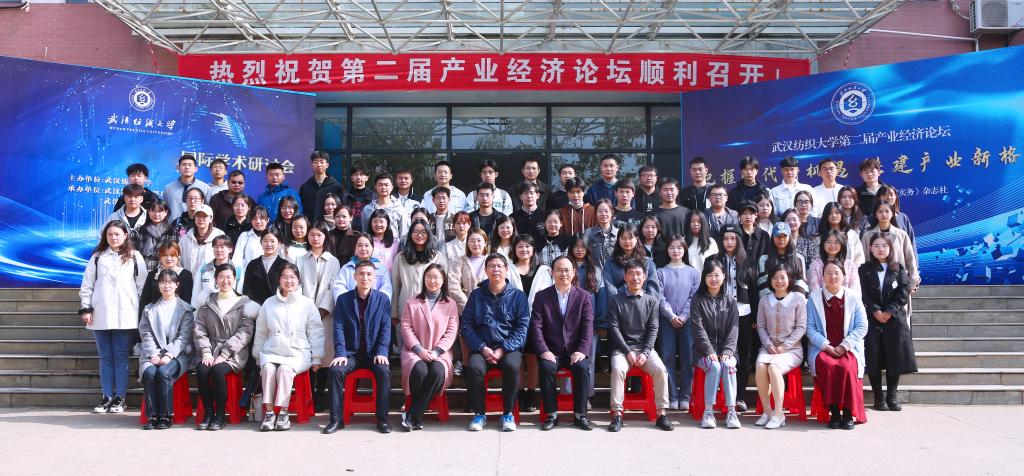
Present at the forum were Mr. Yin Chuanming , second-level Commissioner of Hubei Provincial Department of Economy and Information Technology, Mr. Feng Jun, Standing Member of the Party Committee and Vice President of Wuhan Textile University, Mr. Wang Dong , Standing Member of the Party Committee and Dean of Graduate School of Wuhan Textile University, Mr. Xu Chaoyang , President of Journal Society of Wuhan Textile University, and Mr. Wang Liangbo , Vice Dean of Institute of Science and Technology Development of Wuhan Textile University. At the same time, Ye Xueping , Director of the Institute of Economics of Hubei Academy of Social Sciences, Wei Long , Dean of the School of Economics of Wuhan University of Technology, Song Deyong , second-level Professor of the School of Economics of Huazhong University of Science and Technology, Yu Xiaohua , Chair Professor of Agricultural Economics of Developing and Transforming Countries of Gottingen University, Shen Kailing , Associate Professor of the School of Economics of the Australian National University and Ye Maosheng , Associate Professor of the School of Economics of Wuhan Textile University were also invited to deliver relevant keynote speeches. The teachers and students of the School of Economics participated in this forum.


The opening ceremony was presided over by Duan Dingqiang , dean of the School of Economics. There were two items on the agenda for the opening ceremony. Feng Jun, member of the Standing Committee of Party Committee and Vice president of Wuhan Textile University, and Yin Chuanming , second-level inspector of the Hubei Provincial Department of Economy and Information Technology, delivered a welcoming speech and a speech respectively. In his welcome speech, Feng Jun, on behalf of Wuhan Textile University, first expressed his warm welcome and heartfelt thanks to all the scholars and guests attending the conference and wished the Industrial Economic Forum a smooth convening. He also combined the Party's twenty Congresses with the current scientific research and put forward three suggestions for the smooth progress of the next scientific research work of the School of Economics: First, we need to attach great importance to the development of think tanks, second, we need to conduct research based on industries, and third, we need to strengthen connectivity with our superiors. The discipline construction is inseparable from the support and guidance from all walks of life. We look forward to hearing the insights of all scholars through this forum, helping to improve the overall academic level of the university, and contributing to the realization of "Beautiful textile".
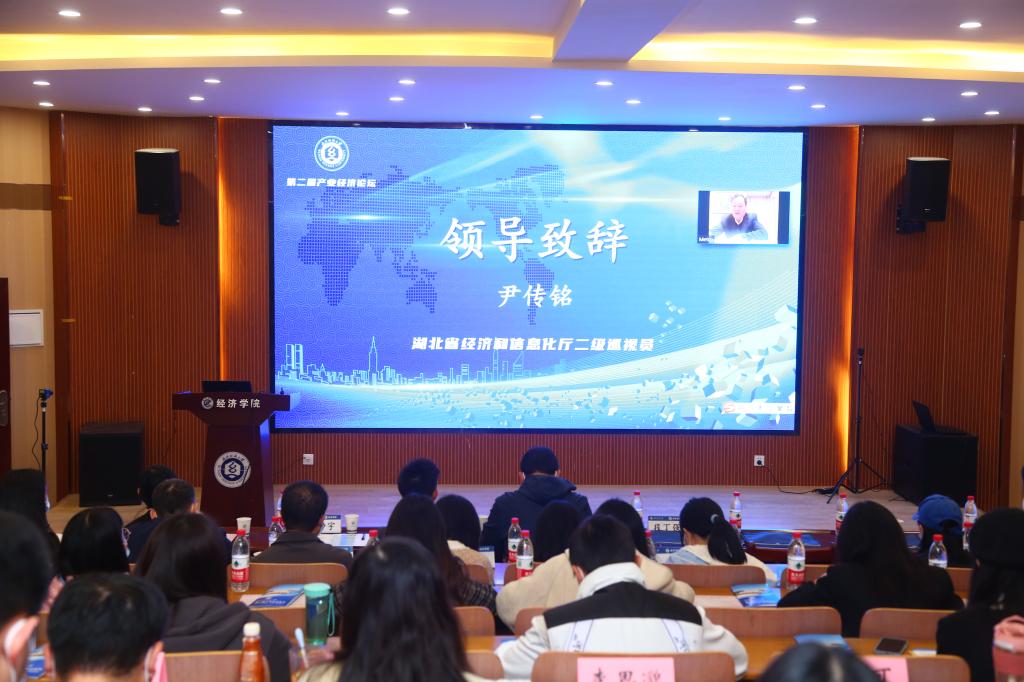

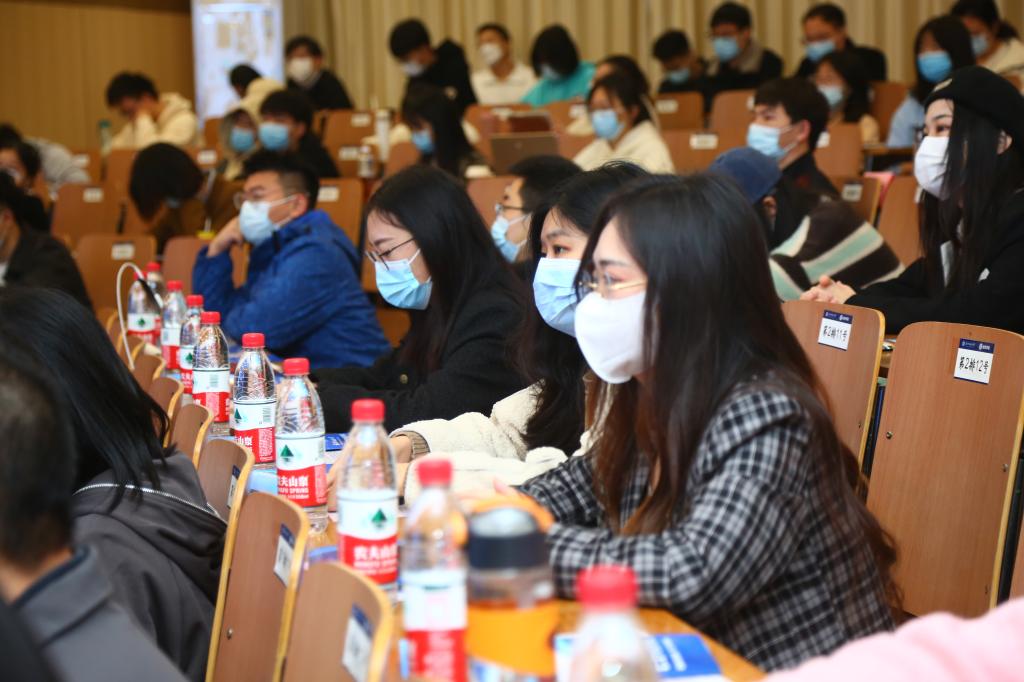
Before delivering his speech, Yin Chuanming first agreed with Feng Jun's speech and also praised Wuhan Textile University for a series of achievements in recent years. He said that today's textile industry has become one of the most active industries in innovation mode because of its integration with the digital economy. Then he summarized the current development trend of the textile industry in Hubei Province and affirmed the "textile power" represented by Academician Xu Weilin, the president of Hubei Province. He also combined the relevant contents of the 20th CPC National Congress and the 12th CPC Congress of Hubei Province with the industrial development, affirmed the current development situation of Wuhan Textile University and put forward the countermeasures to solve the difficulties, looking forward to the forum to stimulate more ideological sparks, at the same time for the development of Hubei textile industry to make more in-depth discussion.
After the brief opening ceremony, the keynote speech kicked off. Ye Xueping , Director of the Institute of Economics, Hubei Academy of Social Sciences; Wei Long , Dean of the School of Economics, Wuhan University of Technology; Keling Shen, Associate Professor of the School of Economics, Australian National University; Song Deyong , second-level Professor of the School of Economics, Huazhong University of Science and Technology; Yu Xiaohua , Chair Professor of Agricultural Economics in Developing and Transforming Countries, University of Gottingen, Germany; and Ye Maosheng , Associate Professor of the School of Economics, Wuhan Textile University Bring on a great speech in turn. The keynote speech session was presided over by Bin Wang, Deputy dean of School of Economics, Wuhan Textile University.
Ye Xueping: Strengthen innovation-driven, accelerate the construction of Hubei modern industrial system
Modern industrial system is a dynamic concept, it is the real economy, scientific and technological innovation, modern finance, human resources coordinated development of the industrial system, Ye compared the traditional industrial system and modern industrial system. From the basic connotation, it shows that the construction of modern industrial system is the inevitable requirement to promote the high-quality development of economy, the urgent need to win the competition initiative of great powers, and the important measure to build a modern socialist country in an all-round way. Ye then compared the industrial system planning of Hubei Province and the whole country before and after the 12th Five-Year Plan, the 13th Five-Year Plan and the 14th Five-Year Plan, and sorted out the specific changes of the industrial system. On this basis, he put forward the policy suggestions of adhering to innovation-driven development and accelerating the construction of the state-owned system modern industrial system. To be specific, Ye put forward three suggestions. We will fully implement the strategy of innovation-driven development, keep the lifeblood of science and technology firmly in our own hands, and accelerate the realization of self-reliance and self-improvement in science and technology through investment and human resources. Secondly, it is hoped to build the national new development pattern pilot zone, accelerate the formation of a number of backbone industries and industrial clusters with national radiation and international competitiveness; Finally, it is proposed to promote the construction of "three highlands and two bases", to build the national highland of science and technology innovation, the national highland of manufacturing power and the national highland of digital economy development, to build the national base of modern agriculture and the national base of modern service industry, and to accelerate the construction of Hubei modern industrial system.
Wei Long: Multi-layer thinking of industrial chain and supply chain security
Starting from the special background of China's industrial chain supply chain, Wei pointed out that currently the conflict between China and the US in the field of advanced manufacturing is becoming increasingly fierce, and the global industrial competition pattern is undergoing major adjustment. In this environment, Wei Long believes that we should attach importance to the security and reliability of our industrial chain and supply chain, and analyzes and demonstrates from four perspectives of necessity, importance, feasibility and controllability. He believes that the points we can start from should include system security, market security, technology security and enterprise security, among which enterprise security refers to the reliable production and operation of some key central enterprises and state-owned enterprises. Wei elaborated on the safeguard measures of industrial chain and supply chain security, holding that the three approaches that can be taken include adhering to global multilateralism, strengthening regional and bilateral cooperation and accelerating the construction of a unified national big market. It can be said that the security of industrial chain and supply chain is an important guarantee for China to complete the process from a manufacturing power to a manufacturing power and then to a world power.
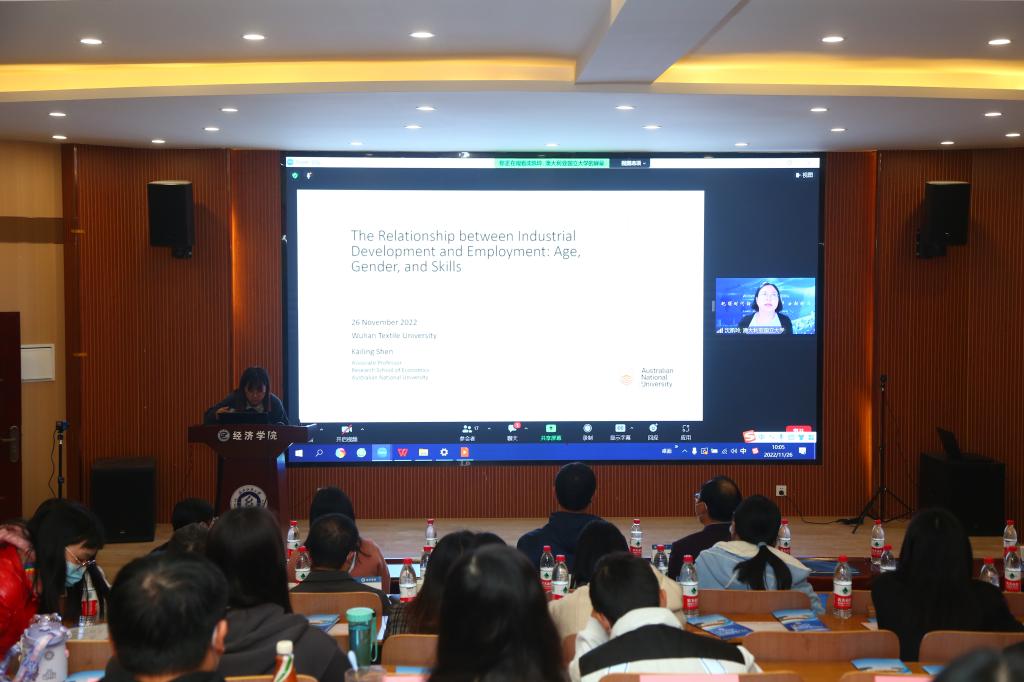
Shen Kailing: The relationship between industrial development and employment:from the perspective of gender, education and migration
From the perspective of labor economics, Shen studied the preference of each industry in employment by quantitative method, and provided some ideas for the development of industrial economy from a micro perspective. First of all, Shen described the relationship between age and population mobility in employment. When applied into practice, enterprises' understanding of the age structure of the vocational skill set recruited in advance will help them recruit more needed employees better, and better old-age care facilities provided by the government will generate more mobile labor force. Secondly, Shen elaborated the relationship between employment and gender, and put forward the view that there exists gender and age distortion in the workplace. She believed that enterprises should encourage women's competitive applications and provide more explicit information to achieve better gender balance. In the end, Shen connected industries with skills and believed that many industries have overlapping skill requirements. Understanding the connection between industries in the utilization of skills will expand the potential labor resource pool and help predict the shortage of workers caused by spillover from other industries.
Song Deyong: Innovative Industrial clusters and urban entrepreneurial vitality -- on the moderating role of digital economy
Song Deyong used the registration data of industrial and commercial enterprises to sort out the number of new enterprises at the city level from 2007 to 2019. Through empirical analysis, he found that innovative industrial clusters can significantly improve the entrepreneurial vitality of the city, and the conclusion is robust. And innovative industry cluster mainly through talent channels, technology channels, capital channels and cost channels to affect the city's entrepreneurial vitality. In addition, Song believes that the digital economy can enhance the entrepreneurial effect of innovation industry clusters, and it plays a role mainly through technology channels and cost channels. Finally, after the heterogeneity and further analysis, Song pointed out that the entrepreneurial effect of innovation industry clusters can be promoted by increasing the investment in science and technology, improving the business environment and attracting the influx of population. Based on the above conclusions, Song believes that while developing innovative industry clusters, we should strengthen the design and arrangement of entrepreneurship system, so as to effectively promote the full play of its entrepreneurial effect. The transmission channels of urban talent gathering, technology and capital should be thoroughly dredged. We should promote the development of the digital economy and consolidate the advantages that information technology brings to mass entrepreneurship. For cities with scarce economic resources, financial support should be provided, and these cities should also optimize their business environment, stabilize the expectations of market players, and improve policies to guarantee the introduction of talent, strengthen the stickiness of urban talents, and avoid the loss of existing talents.
Yu Xiaohua:Trade Network and Global Dairy Industry Development
Yu first elaborated on the importance of milk for nutrition and health, noting that with the economic development of China and other developing countries, milk consumption will continue to grow. According to Yu, the dairy industry has three dimensions that are closely related to sustainable development, including climate change, animal protection and land resources and biodiversity. When analyzing the development of dairy industry, Yu mainly applied the trade network analysis method to organize and summarize the import and export volume and objects of dairy products in various countries and regions around the world. In the trade network analysis method, the role of "authority" can affect the flow direction of the network. Yu analyzed that although China is a net importer, it still has a great influence on the dairy trade network. Belong to the "authority" role. In addition, Yu found that the global dairy trade network model is very robust, which is a unified and stable trade network with Europe as the center. Finally, Yu pointed out that from the perspective of dairy products, in today's world and in the future, many things are changing, including energy, food prices, the development of cold chain logistics, animal protection, climate change and the economic growth of China and India. In the future, the global demand for dairy products will be even greater. The resulting changes in global industrial structure and feed industry supply will bring more problems to be studied.
Ye Maosheng: Global Textile Industry transfer and transformation and upgrading of China's textile Industry
Ye reviewed the historical background of the new round of industrial transfer of China's textile industry, summarized the experience of international textile industry transfer by taking the United States and Japan as examples, and analyzed the inward and outward advantages of China's textile industry. The inward advantages include low labor cost, large national tax incentives and strong national geographic advantages in Southeast Asian countries. The external advantages include high labor quality, low financing cost, strong infrastructure, good business environment and sound industrial development foundation. Finally, Ye put forward some policy suggestions for our textile industry to make use of the advantage of digital economy to realize industrial digitalization. Specifically, one is to realize large-scale flexible customized production, two is to improve the efficiency of enterprise digital management, three is to accelerate the promotion of small and medium-sized textile and apparel enterprises digital transformation. Fourth, the digital transformation is expected to promote the coordinated development of Chinese textile and clothing industry chain across regions.
The theme of this forum is "Seize the new opportunities of The Times, build the new industrial pattern". The academic papers, research cases or research reports centering on the theoretical and practical problems arising in the process of industrial modernization in China were reviewed anonymously by the organizing committee of the Forum, and finally selected 2 first prizes, 4 second prizes, 8 third prizes and 12 awards of excellence.
First prize: Li Yuqin, Ma Yonghong
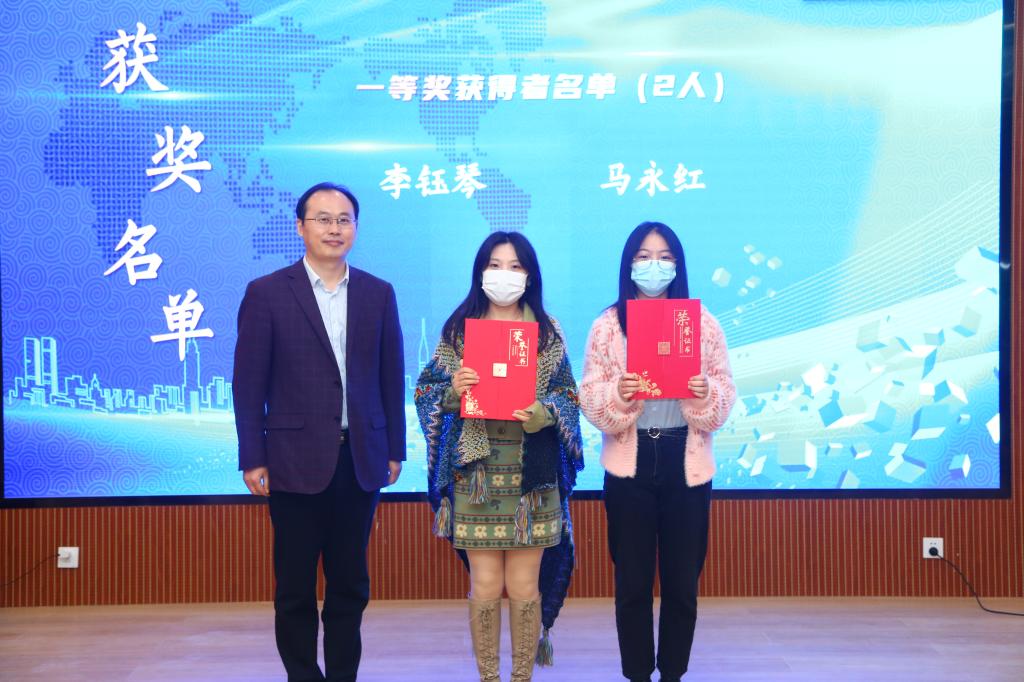
Second Prize: Chen Junkang, Fan Binglu, Gao Zixin, Lin He
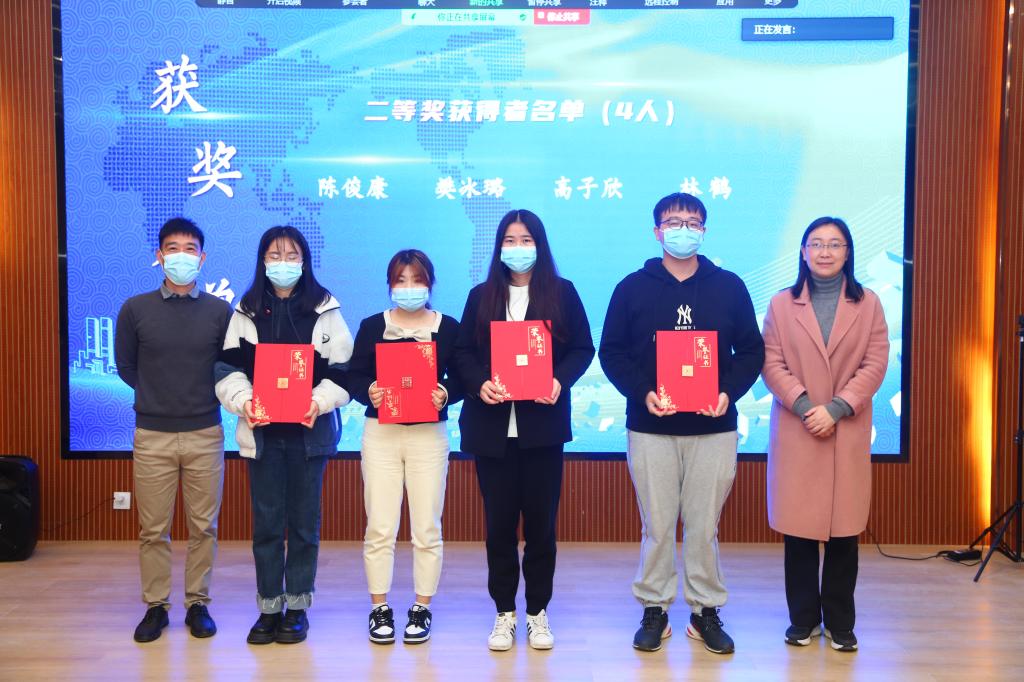
Third Prize:Chen Jiuping, Cheng Ling, Huang Jiamin, Yin Hang, Zeng Lizhen, Zhang Yue, Zhou Zhiqiang, Zou Juan
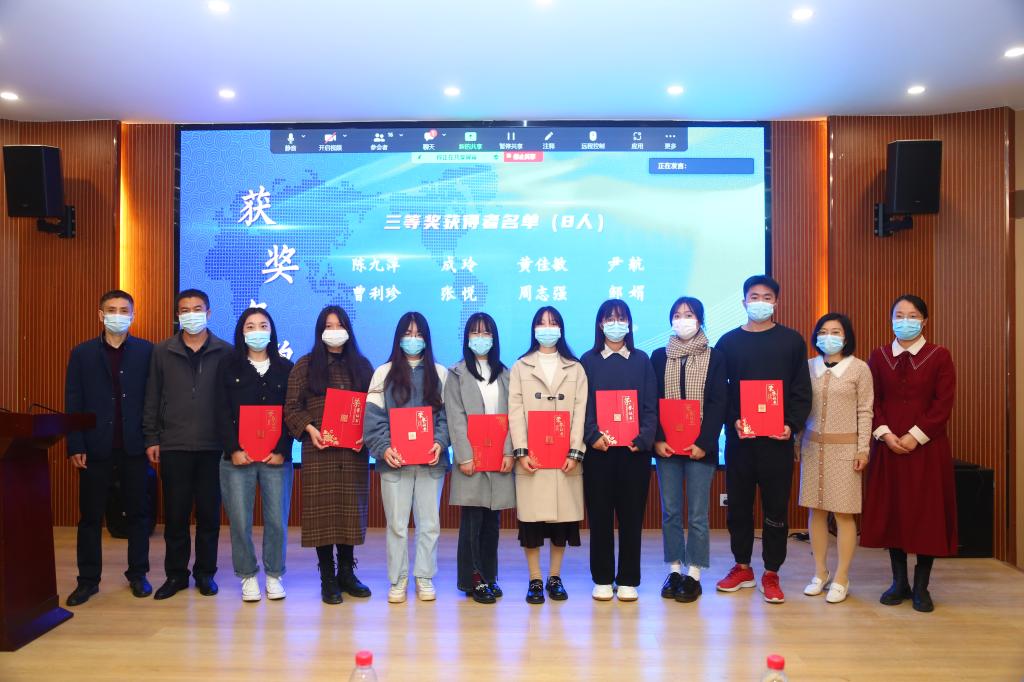
Outstanding Awards: Deng Siyu, Gan Songguo, Hu Lijuan, Li Simiao, Liu Xuejing, Peng Xiang Huizi, Wang Yibo, Wu Fan, Xu Pei, Xu Hefan, Yang Shidi, Zhang Ke
In the afternoon of the same day, three parallel forums were held simultaneously. 12 graduate and undergraduate representatives delivered theme reports on "Building a new Development Pattern and China's Industrial Modernization". The participants made wonderful comments on each student's report and interacted with the students attending the forum. The forum site atmosphere is warm, and academic atmosphere is strong.